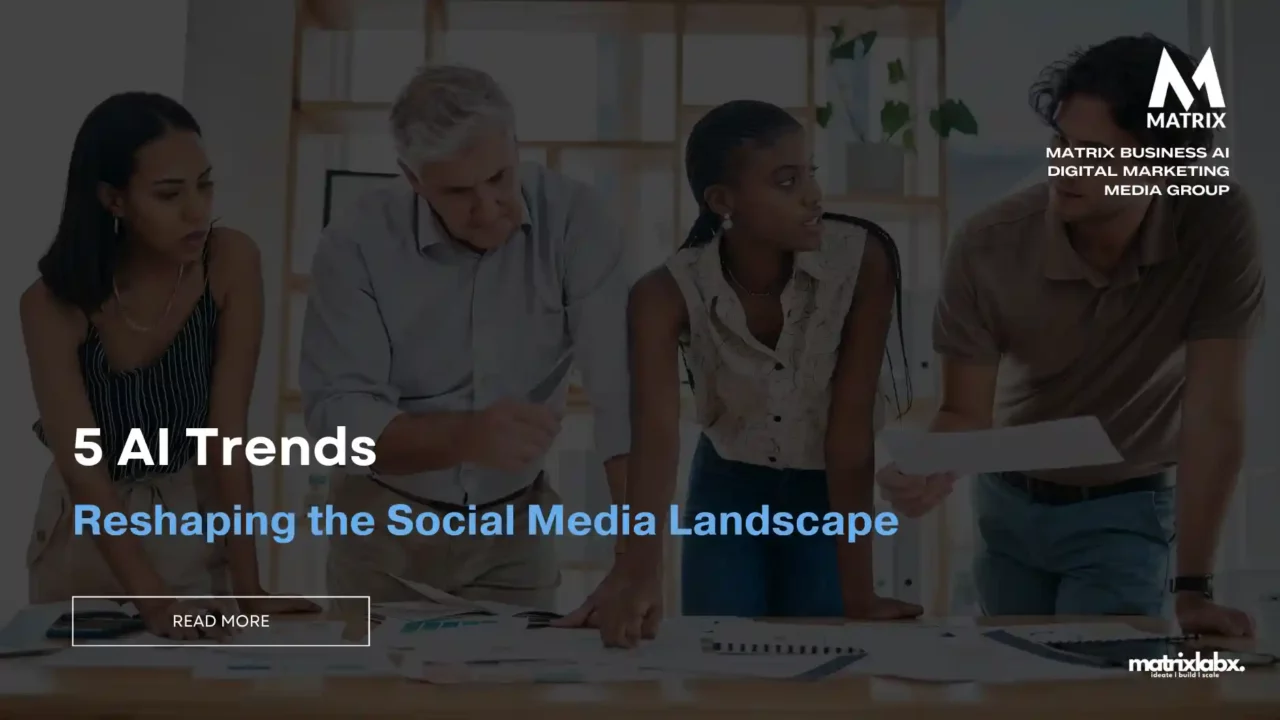5 AI Trends Reshaping the Social Media Landscape
Learn the 5 AI Trends Reshaping the Social Media Landscape.
In today’s digital age, social media is more than just a platform for sharing pictures videos, and updating statuses. It has evolved into a powerful marketing platform leveraged by businesses of all sizes to enhance their brand visibility and drive customer engagement.
With the increasing use of artificial intelligence (AI) technologies, the landscape of social media marketing is continuously changing. This article will discuss five AI trends that are reshaping the way businesses use social media as part of their marketing strategy. Digital Marketing for Solar Companies to Increase Sales
Social Media Landscape Analysis

Executive Summary
Social media has become an essential part of the lives of billions of people around the world, and it is rapidly transforming the way businesses operate. CFOs need to understand the social media landscape to make informed decisions about how to invest in and use social media to achieve their business goals.
Key Trends
The following are some of the key trends in the social media landscape:
- The rise of short-form video: Short-form video platforms like TikTok and Instagram Reels are exploding in popularity, becoming increasingly important for businesses of all sizes.
- The growth of social commerce: Social commerce is buying and selling products and services directly on social media platforms. It is still a relatively new phenomenon, but it is growing rapidly.
- The increasing importance of social listening is monitoring social media conversations to identify trends and insights. CFOs can use social listening to track customer sentiment, identify new opportunities, and assess risks.
Opportunities for CFOs
There are several ways that CFOs can use social media to achieve their business goals, including:
- Generating leads and sales: Social media can be a powerful tool for generating leads and sales. CFOs can use social media to reach new customers, promote their products and services, and drive website traffic.
- Building brand awareness: Social media can build brand awareness and loyalty. CFOs can use social media to share their company’s story, connect with customers, and promote their company’s culture.
- Improving customer service: Social media can be used to improve customer service. CFOs can use social media to respond to customer inquiries, resolve issues, and collect customer feedback.
- Gaining competitive intelligence: Social media can be used to gain competitive intelligence. CFOs can use social media to track their competitors’ activities, identify new trends, and assess their competitive position. Digital Marketing for Solar Companies to Increase Sales
Challenges for CFOs
There are also several challenges that CFOs face when using social media, including:
- Measuring ROI: It can be difficult to measure the ROI of social media investments. CFOs need to develop clear metrics to track the success of their social media campaigns.
- Protecting brand reputation: Social media can be a double-edged sword. While it can be a great way to connect with customers and build brand awareness, it can also be used to spread negative information about a company. CFOs need to have a plan in place to protect their brand reputation on social media.
- Ensuring compliance: CFOs must ensure that their company’s social media activities comply with all applicable laws and regulations. This is especially important for companies that operate in multiple jurisdictions.

Recommendations for CFOs
Based on the above analysis, the following are some recommendations for CFOs:
- Invest in social media: CFOs should invest in social media as part of their marketing strategy. Social media can be a powerful tool for generating leads and sales, building brand awareness, and improving customer service.
- Develop a social media strategy: CFOs should develop a strategy that aligns with their overall business goals. This strategy should identify the target audience, the social media platforms to use, and the types of content to share.
- Measure ROI: CFOs should develop clear metrics to track the success of their social media campaigns. This will help them to justify their investment in social media and to identify which campaigns are most effective.
- Protect brand reputation: CFOs should have a plan to protect their brand reputation on social media. This includes monitoring social media conversations, responding to negative comments, and managing crises.
- Ensure compliance: CFOs must ensure their company’s social media activities comply with all applicable laws and regulations.
Conclusion
Social media is a rapidly evolving landscape, and CFOs must stay informed about the latest trends and developments. By investing in social media, developing a strategy, and measuring ROI, CFOs can use social media to achieve their business goals and create sustainable value for their companies.
1. Customized User Experiences
One of the most influential ways AI makes a difference in social media marketing is by providing personalized user experiences. These customized experiences can be facilitated through the use of AI-driven CRM systems. CRM, or Customer Relationship Management software, allows businesses to gain insights into customer behavior and engagement, enabling them to deliver high-quality, personalized content and ads.
2. AI and Google Marketing
Google, one of the largest players in the digital marketing space, has made significant strides in integrating AI into its marketing platform. Google Marketing AI tools like Google Ads use artificial intelligence to optimize ad campaigns, making it easier for businesses to reach their target audience. It analyzes data from millions of sources to develop insights about user habits and preferences, vastly improving ad targeting and cost-efficiency.
AI and Google Marketing
Artificial intelligence (AI) is rapidly transforming the world of marketing, and Google is at the forefront of this transformation. Google Marketing offers a suite of AI-powered tools and solutions that help businesses of all sizes to reach their target audience, grow their customer base, and boost their sales.
Here are just a few examples of how AI is being used in Google Marketing:
- Smart Bidding: Smart Bidding uses AI to automatically set bids for ads across all of Google’s channels, helping businesses to get the most out of their advertising budget.
- Performance Max: Performance Max is a new AI-powered campaign type that helps businesses to achieve their marketing goals across all of Google’s channels and inventory.
- Discovery ads: Discovery ads are visually rich ads that appear on Google Search, YouTube, and other Google properties when people are browsing content related to their interests. AI powers discovery ads to help businesses reach people who are most likely to be interested in their products or services.
- Audience insights: Audience insights is a tool that uses AI to help businesses understand their customers and target their marketing messages more effectively.
- Creative recommendations: Creative recommendations is a tool that uses AI to suggest new and creative ideas for ad campaigns.
In addition to these specific tools and solutions, AI is also being used to improve the performance of Google Marketing products and services in general. For example, AI is used to personalize the search results that people see, to recommend relevant videos on YouTube, and to improve the targeting of Google Display ads.
As AI continues to develop, it will likely play an even greater role in Google Marketing. Google is already investing heavily in AI research and development, and it is committed to using AI to help businesses succeed.
Here are some of the benefits of using AI in Google Marketing:
- Increased efficiency: AI can automate many of the time-consuming tasks involved in marketing, such as setting bids, managing campaigns, and creating content. This can free up marketers to focus on more strategic tasks.
- Better targeting: AI can help marketers target their messages more effectively by identifying and understanding their ideal customers. This can lead to increased conversions and sales.
- Improved performance: AI can help marketers improve the performance of their campaigns by optimizing bids, creative, and landing pages. This can lead to a lower cost per acquisition and higher ROI.
Overall, AI is a powerful tool that can help businesses to improve their marketing results. Google Marketing offers a suite of AI-powered tools and solutions that businesses of all sizes can use to reach their target audience, grow their customer base, and boost their sales.
3. Predictive Analytics
Predictive analysis is another powerful tool for reshaping the social media landscape. By using AI to analyze past and present data, predictive analysis allows marketers to anticipate customer behavior and trends. This can help them better understand their audience and target their marketing efforts more effectively.
4. Chatbots and Virtual Assistants
AI-driven chatbots and virtual assistants are gradually becoming the norm in customer service and engagement. They offer a fast, efficient way to interact with customers, answering queries and providing information 24/7. Through machine learning, these virtual assistants can analyze and learn from past customer interactions, improving their ability to handle complex queries over time.
5. Content Generation and Curation
AI can also help in content generation and curation. For example, some social media platforms use AI to recommend content to users based on their interests and previous interactions. Similarly, businesses can use AI to generate content that is more likely to engage their target audience, thus driving increased traffic and engagement.
In conclusion, AI is rapidly changing how businesses approach social media marketing. Whether through customized user experiences, integration with Google Marketing, predictive analytics, or AI-driven chatbots and content curation, businesses that embrace these trends will likely experience increased customer engagement and, ultimately, improved business outcomes. As we propel into the future, one thing is certain – AI will continue to play a central role in the evolution of the social media landscape.

